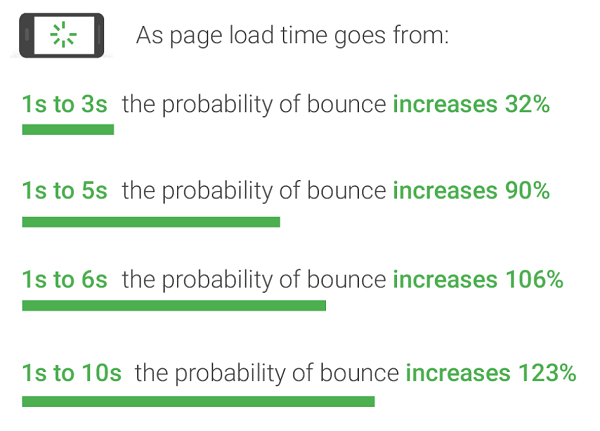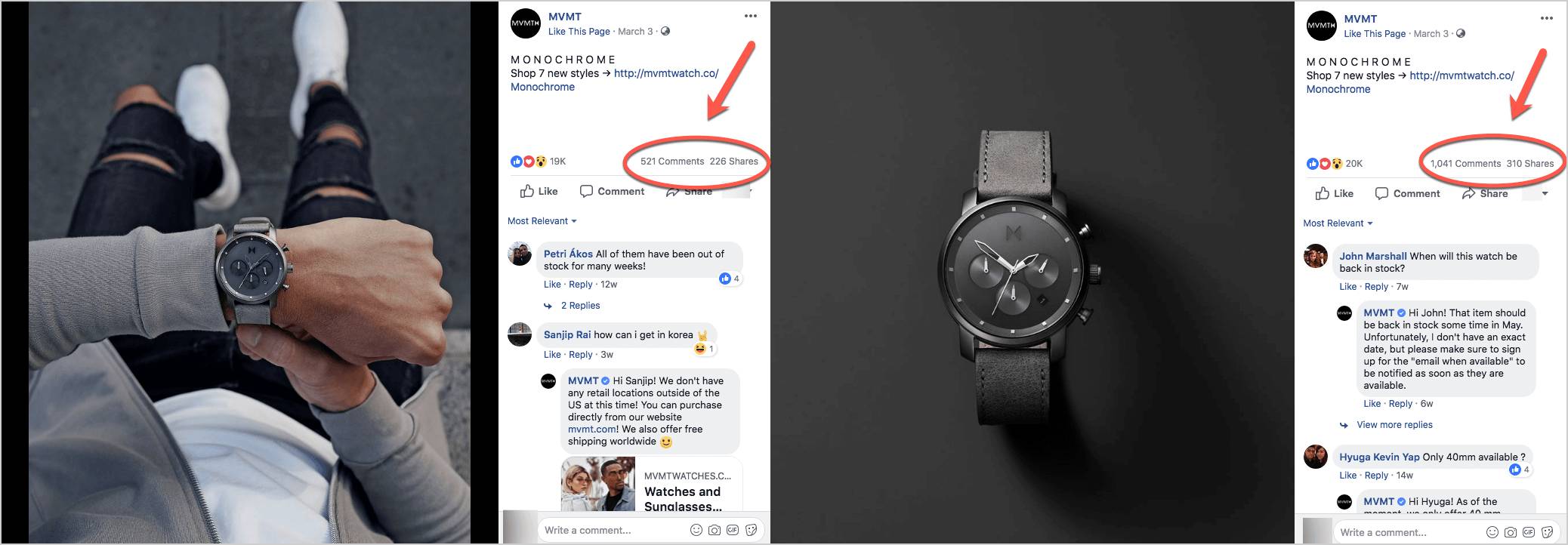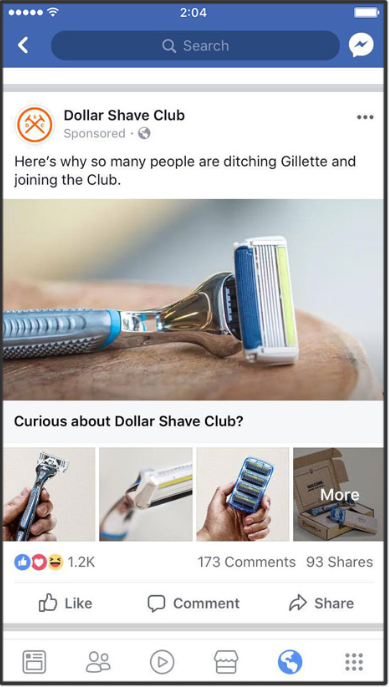Pay-per-click (PPC) marketing is one of the leading digital channels various sizes of businesses use to reach their customers. A 2018 survey by Clutch reveals that 45% of small businesses do PPC advertising. Certainly, PPC marketing can be rewarding, but it can also be expensive and expend your entire budget within a short time. Consider these 19 PPC mistakes that can kill your business. You need to avoid these mistakes if you want to keep your business alive and succeed in PPC advertising.
Avoid these mistakes, and you’ll be able to drive a lot of targeted prospects to your website and turn them into loyal customers.
PPC Mistake #1: Not Knowing and Targeting Potential Buyers in Your Ads
Your ads would be flat, generic, and mediocre when you try to make everyone your customer. Instead, target people who need your product or service. For you to reach these people with PPC advertising, you need to know who they are. What’s their marital status? Do they have kids? What are their interests and hobbies? What’s their age group? You should have clear pictures of your ideal customers. Gather all the information you need about them and create buyer personas.
Popular PPC platforms like Google Ads, Facebook Ads, and Bing Ads offer a variety of powerful options that let you target your ideal customers based on the information you have about them. For example, if your customers are parents of preschoolers (4 – 5 years), Google Ads lets you target its search users based on that information.
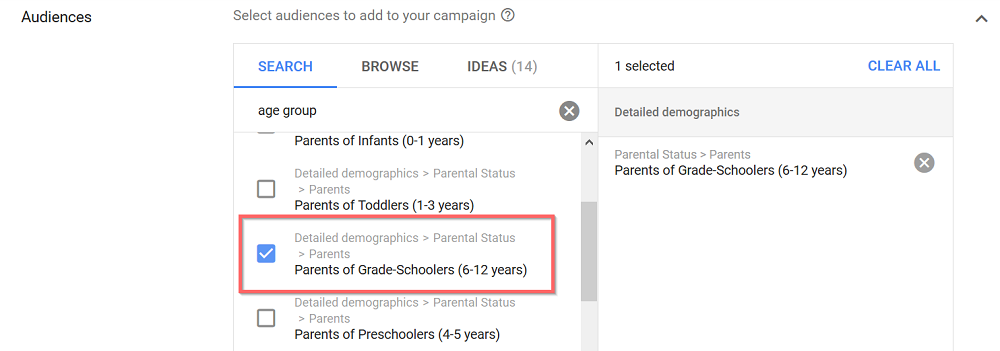
PPC Mistake #2: Not Bidding on Your Brand Name
Your company may not be famous like Coca-Cola and Apple. But not bidding on your brand name on Google could hurt your company’s revenue. If you don’t bid on your brand name, your competitors will do it. They could use it to steal valuable customers from your business.
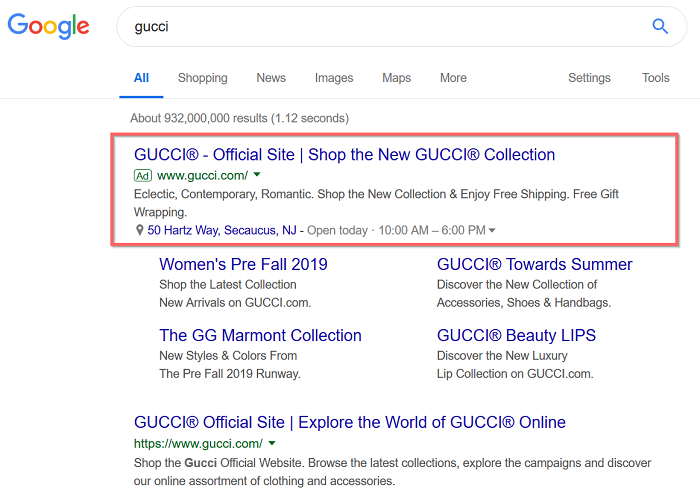
If a popular brand like Gucci is bidding on its brand name to protect its business and gain new customers, your company should do the same. You don’t want your competitors to take that number one position when prospects search using your brand or product name. That’s why you should bid on it.
PPC Mistake #3: Not Advertising Across Multiple Devices
Don’t do PPC marketing as if it’s 2005. Back then, most web traffic came from desktop PCs. Today web users have multiple devices. A web user could start a task on a smartphone and switch to a tablet later. The same user could finish the task on a laptop. People move across devices (smartphones, tablets, and laptops) throughout the day. According to Econsultancy, more than 40% of online adults are multi-device users.
So, don’t just advertise on smartphones. You should advertise on desktops, and tablets too. Maintaining visibility across multiple devices is essential if you want to keep your business alive. Advertising platforms give you the freedom to reach customers across multiple devices.
PPC Mistake #4: Not Optimizing Your Ads for Revenue
An ad that doesn’t help you generate revenue is worthless. Let’s say that you’re a car dealership in Miami that sells luxury cars. Because you want to improve a metric like click-through-rate (CTR), you started targeting keywords like “how fast is Ferrari.” And you also target 18-24-year-old men. Yes, you would get a lot of clicks, but you would make no sales. Someone who searched for “how fast is Ferrari” is still in the early stage of their purchase journey. They haven’t chosen the car brand they want to buy. And most 18-24-year-old men can’t even afford to buy a Ferrari.
The best way to know an ad campaign is making money is to track and measure it by revenue. Revenue should be what matters to your business. A PPC campaign can have the worst ad impressions, clicks, CTR, the average cost per click (CPC), quality score, and still generate the most revenue. For example, I got the images below from Unbounce.
In the first image, the metrics were focused on traffic.

Now, look at the second image below when it’s focused on revenue.

Campaign Four: generated the most sales, revenue, return on investment (ROI), and has the best cost per sale (CPS).
Revenue: is what keeps your business alive — not vanity metrics.
PPC Mistake #5: Not Regularly Monitoring and Improving Your Ads
PPC advertising may look too easy. You set it up, run it, and you can forget about it as long as you continue to get sales each day or week. What you may not know is, even though your ads are generating sales, your PPC campaigns may be bleeding money. Your competitors could be doing better with their PPC campaigns. And that could help them knock you out of business. You need to be at the top of your game if you want your business to continue growing.
Successful advertisers know that they can’t forget about their ads while they run. They continuously monitor their ads and improve them. When you regularly monitor your campaign’s performance, it’s easy to know which ad groups are losing money. It’s easy to know which ad groups to delete and which to improve.
PPC Mistake #6: Not Allocating Enough Budget to Your PPC Campaigns
Before you get started, you should first determine if running PPC will be profitable for your business. If the margins on your products are small, and the cost per click for your keywords is high, PPC may not be the right channel for you. If PPC can be profitable for your business, that’s great. Then don’t make the mistake of not allocating enough budget to your PPC campaigns. With too little budget, you risk not seeing enough volume of clicks, conversions, and sales to reach profitability.
For instance, your campaign may need an average of 50 clicks to be profitable each week. What happens when you can only afford to pay for 10 clicks? It means you don’t have enough budget to run a profitable PPC campaign in your industry.
Here’s another instance of not bidding enough on your keywords. Let’s say people are searching for “used car dealerships near me” in Los Angeles.
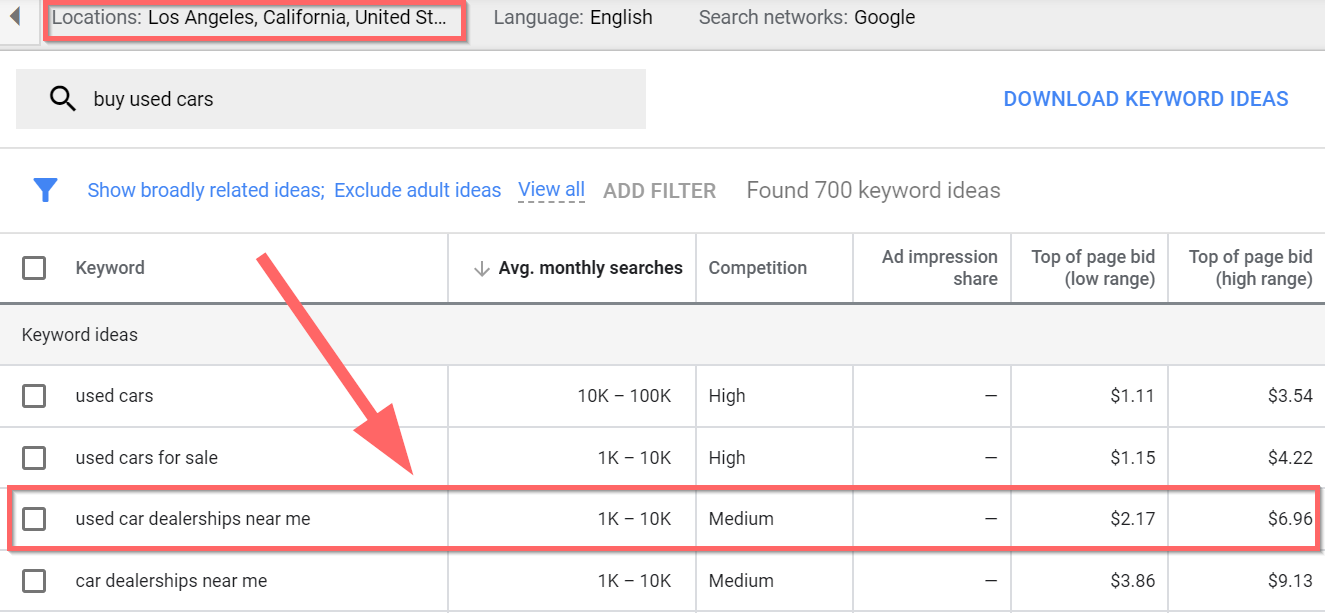
The lowest bid is $2.17. The highest bid is $6.96. These are the most economical and highest prices other advertisers are willing to pay Google for each click. Now, imagine bidding lower than the lowest bid. It means searchers may never see your ads.
So, make sure you have enough budget before you begin.
PPC Mistake #7: Not Having Great Landing Pages for Your Ads
The experience of your landing pages is as relevant as every aspect of your ads. Companies are willing to spend $95 to bring customers to their website, but only $1 to convert them. That seems off. Doesn’t it?
Some PPC advertisers don’t have the skills to design a useful SEO landing page. They either hire someone who has the skills or simply overlook it.
For example, your landing page must load fast if you want to convert prospects who clicked on your ads. Most PPC advertisers don’t have the technical skills to make a landing page load fast.
Web users hate websites that take too long to load.
According to Google, your page should load within the first 3 seconds. That’s the best practice.
If your site isn’t loaded by six seconds, the probability of a potential customer leaving is 106%. Three and six seconds may look too short to you. They are not to web users. Your customers expect your website to load immediately. If your landing page is slow, you’ll lose a lot of prospects who came through your ads.
Your landing page is also where you collect prospects’ contact information. You can’t just ask them to buy on your landing page. You need their contact information like email, which enables you to reach them later. You need the right tool to collect prospects’ information. Conversion deteriorates when your list building software annoys visitors. Using a powerful lead generation tool that enchants is the key.
PPC Mistake #8: Trying to Achieve Too Much in Each PPC Ad
You may be making this mistake if you sell multiple products or services. Maybe, you sell three different kinds of products. You should only advertise one in a PPC advert. One PPC campaign should only sell one product. The same rule applies to your landing pages — one landing page for one product.
For example, a digital marketing agency that sells web design, search engine optimization (SEO), and social media marketing management may only promote one service on each landing page. If you run an e-commerce store with several related products, you can group them into categories. Then promote one category on each landing page.
For example, this Adidas ad only promotes infant and toddler shoes.
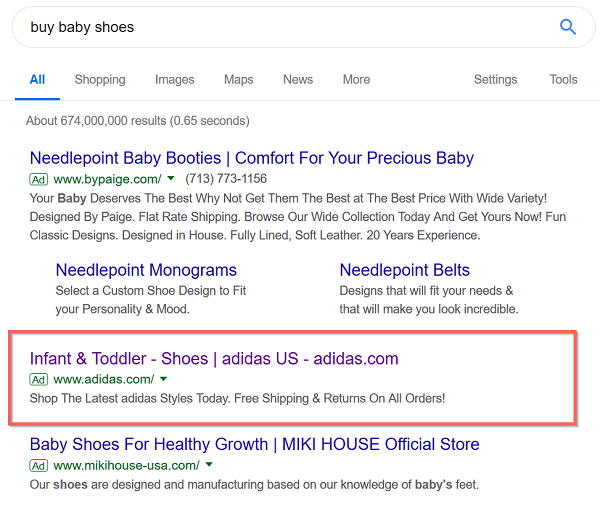
Note that the landing page matched the ad. You can only see various infant and toddler shoes available for sale.
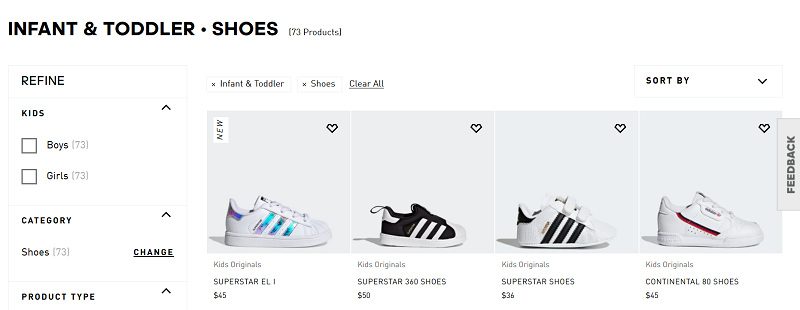
The ad is from Adidas — they know what they are doing — so follow their example: don’t overload your prospects by offering them too many products in one ad and landing page.
PPC Mistake #9: Not Taking Advantage of New PPC Advertising Features
All the top PPC platforms regularly introduce new features. When a competitor uses a new feature, it could give them a significant edge over your business. If you don’t want your business to be left behind, you need to continually experiment with new PPC advertising features when they are introduced. Advertisers who take advantage of new PPC features tend to gain a lot of ground over their competitors. I call them smart advertisers.
Do you want to become a smart advertiser? Read advertising and marketing news sites like AdAge, Social Media Examiner, Search Engine Land, etc. Too often, you’ll see little announcements about new features. Even these small features can help you stay ahead of the competition. Whenever you come across new features on these sites, you should know that many of your competitors may not know about them.
PPC Mistake #10: Not Split Testing Your Ads
Split testing means creating two or more different versions of ads and running them simultaneously. If you’re not split testing your ads, you’re probably losing a lot of sales. You can never know if the current versions of your ads are the best until you do a split test.
For example, MVMT did a split test of their Facebook ads, where they kept everything the same except the images. One image shows the watch on a male’s hand. The other image shows the watch by itself.
The first version, which shows the watch on a male’s hand, may look better to you, but the other version with the watch by itself got more engagement and double comments. Always test different variations of your ads. And only test one element at a time.
Another reason why it would be a big mistake not to split test is that web users can easily have ad fatigue when they see the same ad many times. Split testing is a great way to keep people interested in your ads and business.
PPC Mistake #11: Not Injecting Emotions into Your PPC Ads
Emotional ads are everywhere. TV, radio, billboards, and content marketing are some of the places you see emotional advertising every day. Somehow, most PPC advertisers rarely use emotions in their ads. Here are some Google ads that appear for the keyword “auto insurance.”
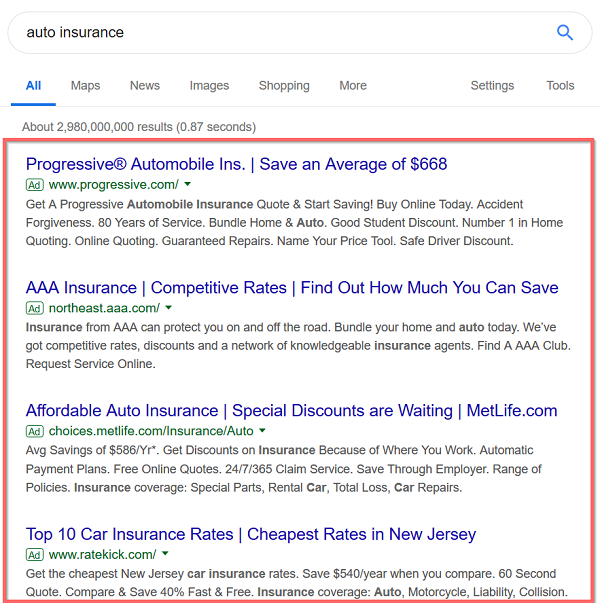
Before writing your ad copy, keep in mind that consumers don’t buy for logical reasons. They buy for emotional reasons. Your PPC campaigns will be successful if you can make buyers feel emotional. Don’t create bland ads. Create ads that make people pause and click.
PPC Mistake #12: Not Creating Unique Ads
If your PPC ads aren’t unique, they won’t get any attention from potential buyers. Consumers are exposed to over 5,000 ads per day. You see ads on TV, on social media, while grocery shopping, reading your emails, and surfing the web. You may not pay attention to them, but they are ads. Few ads capture your attention daily.
There are lots of businesses running PPC ads today. All those ads are vying for consumer’s attention on the web. Your ads need to stand out if you want people to click on them. Don’t copy your competitors’ ads. Yes, you can learn a few things from them. But make sure your ads are unique. Get creative. Create ads your prospects haven’t seen before.
PPC Mistake #13: Not Creating Messages That Fit the Ad Platforms
Google and Bing may both be search engines, but their users have unique traits. Bing users are less techy, more blue-collar than white-collar, and are more likely to have children based on their age. And 85% of people who use Bing are in the United States. That’s just an example of how an ad platform may be different from another. Google ads and Facebook ads dominate the online marketing space. Web users have different expectations when they are on Google and Facebook.
Your Facebook ad copy must fit what people expect to see on Facebook. Using the same ad copy on Facebook and Google is a path to failure. Don’t make that mistake. Every platform online is different. Twitter is different from Facebook. And Facebook is different from Instagram. So, always create ads users of each platform want to see.
PPC Mistake #14: Not Targeting People Based on Their Location
Even if your business serves the global world, you shouldn’t create ads that target all locations. Make sure you target people based on where they live. Location targeting is one of the most popular and powerful features available on PPC platforms.
Facebook’s location targeting feature. You can choose between the four options below:
- Everyone in this location
- People who live in this location
- People recently in this location
- People traveling in this location
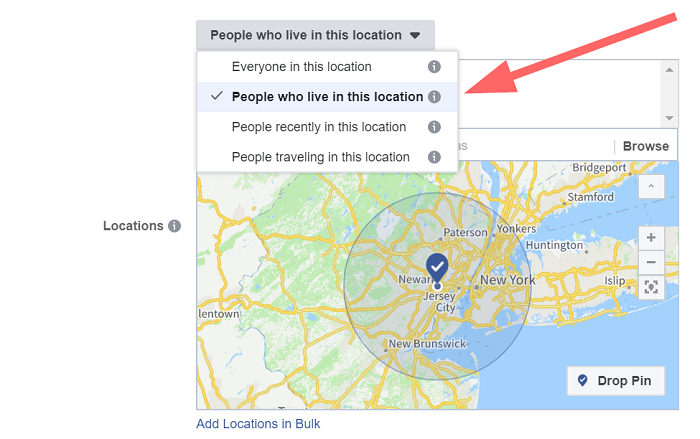
Web users are also doing location-based searches on Google and Bing. Just look at how much “near me” searches have grown over the past five years, according to Google Trends.
PPC Mistake #15: Not Excluding Negative Keywords from Your PPC Campaign
A negative keyword is a type of keyword that prevents your ad from being triggered by a specific word or phrase. People who type that word or phrase won’t see your ads. For example, you can add a word like “free” as a negative keyword. So, if your target keyword is “baby shoes,” a similar keyword like “free baby shoes” won’t trigger your ads even though they look related. According to WordStream, half of the advertisers don’t add negative keywords to their accounts for over a month.
By adding negative keywords to your ad campaign, you’ll be able to prevent people who are not interested in your product or service from seeing your ads. There are plenty of other reliable keyword research tools that you can use. However, Google Keyword Planner is my favorite tool for finding negative keywords. Just enter your keyword into the tool, and you’ll see a lot of negative keywords.
For example, if you sell online calendars, keywords like “calendar organizer” and “2011” should be your negative keywords.
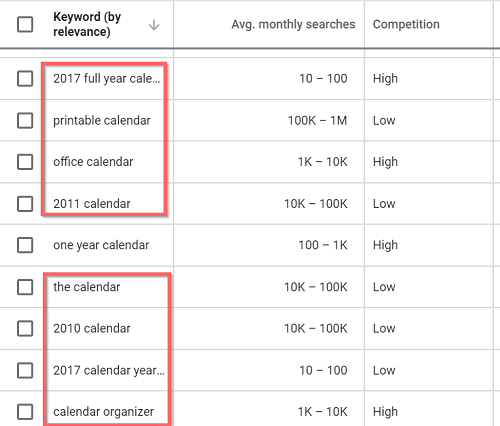
PPC Mistake #16: Creating Boring Ads
If your ads put web users to sleep, don’t expect them to click. Anything normal is boring. For example, sounding professional and corporate may seem reasonable, but it makes your ads generic and boring.
Write something prospects want to see. The ad below is what you want to see if you’re looking for a plastic surgeon.

This ad gets your attention when you see it.
An exciting ad is simple, and it makes prospects curious. Below is an engaging Facebook ad by Dollar Shave Club.
If you want to grow your business with PPC advertising, you need to start creating exciting ads like these.
Top brands like Apple and Adidas are known for creating interesting ads. Their ads capture consumer’s attention and get people talking on social media. These companies hire talented copywriters and digital marketers to help them with their ad campaigns. Some businesses also take help from eCommerce learning platforms to gain the knowledge they need and become self-dependent.
PPC Mistake #17: Targeting Too Many Keywords in One Ad Group
Targeting too many keywords is one of the PPC mistakes many advertisers make today. And it hurts their revenue. You can put 25 – 30 keywords in one ad group. As long as they are strictly related to each other, there’s no problem with that. The truth is that most 25 – 30 keywords are rarely related to each other. Although the keywords may seem like their searchers, want the same thing, the intent behind each keyword is mostly different.
For example, keywords like “affordable gyms near me” and “gym specials near me” may be related, but their intents are different. Your ad copies will resonate better with prospects if you put keywords in separate ad groups. If you want great results from your PPC campaign, your ad group should contain no more than four to five keywords.
PPC Mistake #18: Leaving Losing Ads for Too Long
An ad campaign could start the week badly and end strongly, and vice versa. That happens a lot. It’s normal. But when you leave a losing ad campaign for too long, it becomes a money pit. How long should you let a losing ad run?
Two weeks.
If you’d ran an ad for two weeks, you’ve covered different days twice. That’s enough to know if an ad is a money maker or loser. Once you realize that an ad isn’t generating sales by the 14th day, stop it. PPC marketing is highly rewarding when you let your winners run and end your losers early.
PPC Mistake #19: Tweaking Winning Ads Too Often
There’s nothing wrong with tweaking your winning ads to make them better. But when you tweak every hour, day, or a week, it distorts results. Instead of tweaking your ads, experiment. Make a change or two and let it run for one to two weeks without touching it again. At the end of that experiment, it’s easier to know if the change you made improved sales or not.
Conclusion
Avoiding these 19 PPC mistakes will help you take your business to the next level. You don’t have to repeat the same mistakes others are making today. If you want your business to grow faster than ever, bookmark this page and come back to it each time you’re managing your PPC campaigns. Make sure that you aren’t making any of those mistakes above. When you do that, you’ll be able to build a successful business through PPC advertising.

